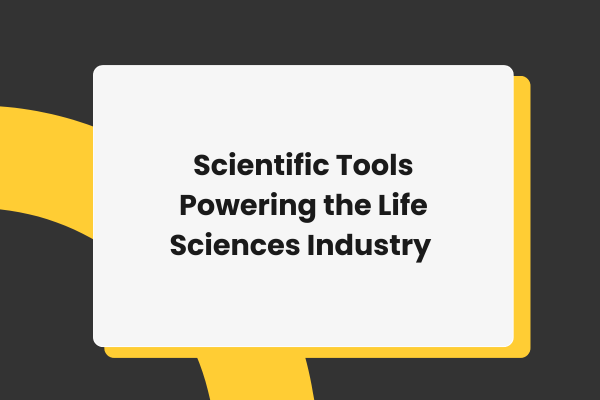
What Are Scientific & Research Tools?
Scientific and research tools refer to the wide range of instruments, software, methodologies, and technologies used by researchers to observe, measure, analyse, and interpret natural or engineered systems. These tools are essential in all fields of science, such as biology and chemistry, physics, engineering, drug discovery and drug development.
Creators of scientific instruments play a central role in both drug discovery and development. This allows scientists to understand biological systems, identify promising drug candidates, and ensure their safety and efficacy.
For job seekers in the life sciences industry, understanding the value of these tools opens the door to a wide range of career opportunities. Scientific tools don’t just support and define research. From spectrometers that detect molecular structures to automated systems that accelerate data analysis, these technologies allow scientists to explore new frontiers with accuracy, speed, and reproducibility.
Key Benefits of Scientific & Research Tools in the Industry
In short, scientific tools and instruments are foundational to modern science and technology. These tools empower discovery, improve understanding, and support practical solutions to complex challenges.
- Accuracy & Precision: Instruments such as spectrometers, microscopes, and measuring devices let scientists collect data with high accuracy and precision. This reduces human error and improves the reliability of results.
- Enhanced Observation: Tools such as telescopes and electron microscopes help understand structures, behaviours, and processes.
- Data Collection & Analysis: Sensors, imaging and analytical instruments grant for automated, real-time data gathering and data analysis. This enables pattern recognition, statistical modelling, and forecasting.
- Reproducibility: Standardised instruments ensure that experiments can be repeated with similar results by different researchers, which is key for scientific validation.
- Time & Efficiency: Automated tools increase the speed of research (e.g., high-throughput screening in drug discovery) and reduce the manual labour and time required for complex tasks.
- Innovation & Technological Advancement: The development of new tools (e.g., CRISPR, LIDAR, Organ-on-chip) opens entirely new fields of research and innovation, which leads to progress in drug discovery & drug development.
Technology & Trends in Scientific Tools
The Scientific tools sector is constantly evolving, providing researchers with new technology to match the increasing need for medical advancements and sustainability:
- Automation: Researchers are adopting automation & robotics to provide increased efficiency and precision, especially within areas such as Liquid Handling, Sample Handling and Data Analysis
- Artificial intelligence & Machine Learning: There is an ever-increasing demand for AI and ML programs to be integrated into research to analyse complex data, optimise experimental parameters and provide real-time adjustments.
- Organ-on-chip & Microphysiological Systems: The FDA have recently announced plans to “phase out animal testing” for Monoclonal Antibodies and Other Drugs to be replaced by a range of approaches, including AI-based computational models of toxicity and cell lines and organoid toxicity testing in a laboratory setting.
- Sustainability: Sustainability is becoming a keystone in laboratory equipment manufacturing. Manufacturers are focusing on reducing energy consumption, minimising waste, and using environmentally friendly materials.
Popular Roles in Scientific & Research Tools
As the sector grows, so does the demand for skilled professionals. Here are some of the most popular roles:
Molecular Biologist / Biotechnologist: Experts who decode disease mechanisms at the molecular level.
Product Managers Bridging R&D, marketing, client needs and executive leadership. Product Managers are responsible for the full life cycle of new and existing products from concept to launch, as well as post-launch market analytics to ensure new and existing products continue to meet market needs.
Technical Sales: Continued development of new laboratory instruments and products means there is a strong demand for driven sales specialists and leaders who have a technical knowledge of the product line to provide long-term solutions and support to the buyers.
Quality Control and Quality Assurance: QC/QA specialists play an important role in making sure that all products meet quality standards both locally and internationally. They are responsible for areas including inspections, testing, process monitoring, compliance & standards, calibration & maintenance, troubleshooting and training.
Engineering: Supporting R&D and/or support departments to be on the front line of innovation, ensuring new products are created in line with current market needs. Downstream engineers would also support the client with ongoing instrument maintenance, troubleshooting and hardware/software support.
Whether you're just starting or looking to advance your career in healthcare innovation, the scientific & research tools sector offers a future-forward path filled with growth opportunity, impact, and purpose.
Visit our website to understand how we support clients in this space and to see the open job roles we have available.




